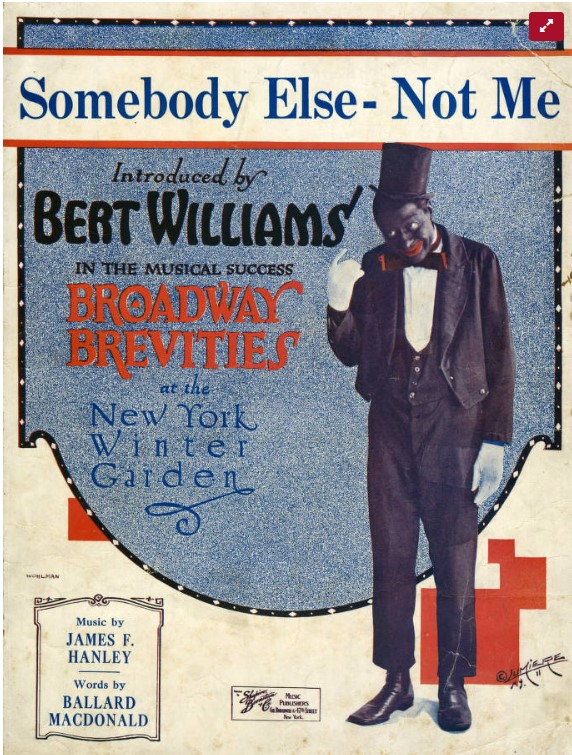In today’s blog post, I want to dive in to talk about Bert Williams (1874-1922), a popular black comedian, singer and film director in the entertainment industry at the turn of the century. He was also a pioneer of bringing African-American participation and involvement in the entertainment and music industry in the early 20th century. I came across Bert Williams as I browsed through the sheet music consortium, finding a printed sheet music of Somebody Else, Not Me published with Bert Williams at the front cover in blackface.

The piece titled “Somebody Else – Not me” was composed by Hanley, James F. (James Frederick), 1892-1942 with lyrics by Ballard MacDonald (1882-1935) for voice and piano. It was famously performed and introduced by Bert Williams in the musical Broadway Brevities at the New York Winter Garden. Featuring Bert Williams himself in blackface, the cover was printed by New York : Shapiro Bernstein & Co, c1920.
The following are the lyrics and recording of the piece “Somebody Else, Not Me” performed by Bert Williams.
To begin with, “blackface” was a racist performance tradition popular in the United States a century or two ago where white Americans of European descent put on temporary black pigments in minstrel shows to portray black Americans in a theatrical or even derogatory manner with the intention to entertain white audiences. Although nowadays, we consider this to be a deeply racist tradition, it was unfortunately a socially-acceptable common practice in the 19th and early 20th century. With the start of racial awakening and awareness stemming from the civil rights movements in the 1950s, the Blackface tradition started to decline and was beginning to be considered as an outright racist practice.
Now, jumping back in time to Bert Williams’ contemporary in the late 19th to early 20th century when minstrel shows and blackface traditions were prominent, that was also a time when racial inequality and discrimination led to the exclusion and devaluation of black people in most industries and professions. Bert Williams himself was born in the Bahamas and migrated with his family to Florida in the United States when he was 11. Despite being a black American, he was determined to be in the entertainment industry and started performing, joining various minstrel troops around the states in 1886 even if it meant that he also had to smear black pigments on his face to partake in shows and entertainments that essentially taunted his own racial identity and experiences. He later met the dancer George Walker and together, they created the first all-black performance cast and was one of the most famous African American performance troupes ever.
Some of the interesting and important things to note is that in Bert Williams’ famous silent-film “Natural Born Gambler”, he appeared in a self-imposed blackface as many other of his works. It presents highly racialized stereotypes and themes such as black people being deceitful and dishonest and taking advantage of wealthy white people. However, as Williams created this as entertainment for white audiences, this film was a great success congruent with societal dynamics. Partly because his role as a black producer and performer himself enables the white audiences to feel even more at ease knowing it was created willingly by a black person himself with the intention to entertain. However, in the ending of the story, the black man is arrested while the white man has a three-day grace period to leave town, reflecting the racial injustice congruent to the time that is still relevant even to this day.
In a way, we can see Bert Williams as a successful breakthrough for black people’s involvement in the entertainment industry even though through his works, he had to reinforce or create racial stereotypes for humor and entertainment. “Blackface” as a practice is in a way a means to be included in a highly racialized society. We see a lot of BIPOC comedians even nowadays participate in self-deprecating humor as a way to entertain or relate to the BIPOC identity and experience.
